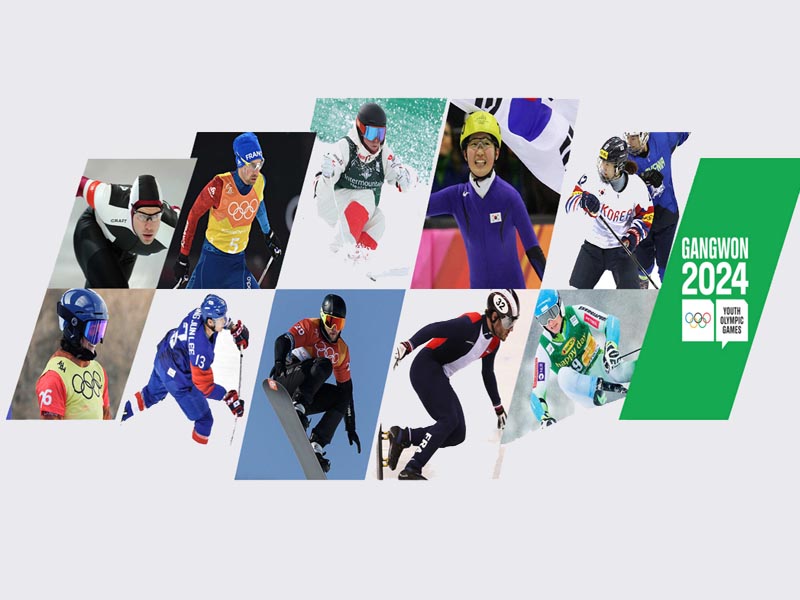Ten additional highly experienced athletes, who will support, advise and inspire participants at the Winter Youth Olympic Games (YOG) Gangwon 2024, have been announced as Athlete Role Models (ARMs) by the International Olympic Committee (IOC).
They join the 17 athletes already unveiled as ARMs and will play a key role as mentors for those competing in Gangwon. The ARMs will share the experience and knowledge they have gained from their own sporting careers.
The latest ARMs to be unveiled are:
Park Jong-ah (KOR, ice hockey)
Lee Young-jun (KOR, ice hockey)
Byun Chun-sa (KOR, short track speed skating)
Thibaut Fauconnet (FRA, short track speed skating)
Haralds Silovs (LAT, speed skating)
Brenden Kelly (CAN, freestyle skiing)
Jakob Spik (SLO, Alpine skiing)
Tess Critchlow (CAN, snowboarding)
Maxime Laheurte (FRA, Nordic combined)
Konstantin Schad (GER, snowboarding)
These athletes will play a vital role in mentoring and shaping the future of young, aspiring athletes as part of the ARM Programme, which has been an integral part of the YOG since the first edition in Singapore in 2010. It provides those competing at the YOG with a chance to learn from experienced Olympians and elite athletes.
Olympic gold medallist Byun Chun-sa, who topped the podium at the Olympic Winter Games Torino 2006 as part of the Korean women’s 3,000m short track relay team, was among those to share her excitement at being able to advise a new generation of young talent.
“It’s an honour to be invited to Gangwon 2024 as an ARM,” she said. “I’m looking forward to sharing my experiences with the young athletes and providing guidance to support their growth.”
For three-time Olympian Thibaut Fauconnet, becoming an ARM felt like a natural progression, having moved into coaching since retiring from competition.
“It’s an important role to me,” he said. “I love to support young athletes. It means a lot to me to try to share all the things that I learned during my career with the next generation.”
And for Canadian snowboarder Tess Critchlow, who competed in the Olympic Winter Games PyeongChang 2018 and Beijing 2022, becoming an ARM felt like the perfect opportunity to give something back to her sport.
“When I was contacted about this opportunity, I was super stoked by the idea of being back in a competition space and to feel as though I’m giving back a little to snowboarding,” she said. “I’ve been thinking of ways to give back, and this was the perfect segue into that. It’ll be so rewarding to help the athletes get as much out of the experience as they can.”
The ARM Programme forms part of the wider Athlete Education Programme (AEP) that will take place during the YOG, helping to maximise the learning experience of all the athletes and their entourage members. The ARMs will be on hand in Gangwon to support the young athletes during training and competitions, and in the Youth Olympic Village during a series of educational activities and workshops.
These include discussing skills and topics to help the athletes’ development, such as career management, injury prevention, digital storytelling and more. For example, in the pre-YOG programme, young athletes and their entourage are encouraged to take an e-learning course on Athlete365 to learn more about the prevention of competition manipulation, and safeguarding, mental health and anti-doping. The course is available in 10 languages.
The ARMs, in coordination with the International Federations, will also host Inside Sport Sessions, providing an opportunity for the young athletes to dive deeper into their sport with tailored Q&A sessions, sports demonstrations and even fireside chats depending on the sport.
The Winter YOG Gangwon 2024 will take place from 19 January to 1 February 2024, with approximately 1,900 athletes from 81 National Olympic Committees expected to take part.
Gangwon was elected as the host of the 4th Winter YOG at the 135th IOC Session in Lausanne, Switzerland, on 10 January 2020. Events will be held in four locations across the Gangwon region – Gangneung, PyeongChang, Jeongseon and Hoengseong – and will build upon the legacy of the Olympic Winter Games PyeongChang 2018 by using some of the same facilities.


